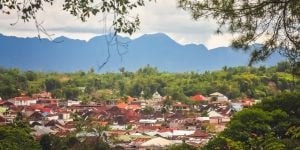BPJS change of rules re foriegn pensioners ?
It seems foreigners on pension visa are now not being allowed access to bpjs , now only foreigners working here or married have access .
I suppose its reasonable as the system is in deficit and supported by the indonesian government .
- Retiring in Indonesia - Guide
- Australian Aged Pension and the 2 year portability rule . - 3 Replies
- Lockdown in Java and Bali - Rules you must follow - 19 Replies
- Covid-19 prevention rules - 5 Replies
- Polygamy marriage rules in Indonesia - 11 Replies
- NEW 2016 Strict immigration Rules FYI - 14 Replies
- Does switching schools require me to change my student KITAS also? - 6 Replies
Is this really a change, or new development? I know a couple of retired foreign expats here, neither of them with Indonesian wives who have been in this national health care system almost from the gecko.
That issue aside, IMHO it only makes sense that any foreigner who has decided to make Indonesia their permanent residence should have access to national health care. Moreover, from an actuarial/underwriting point of view, it always applies in actuarial science to "spread the risk" as far as possible.
as I understand it , some people slipped through the net at the start , but recently people are being refused on a pension visa .
Here in Bali? I hadn't heard that. But, is what you report a surprise to me?
Heck no! 
Bali wouldn't be Bali without all of this sort of confusion and lack of consistency with the administration of new laws/regulations and such. 
One can either pull their hair out in frustration, or go with the flow, and laugh it off. Eventually, things boil down to what is common sense.
I've always taken solace in Dorothy's famous words to her dog in the Wizard of OZ.
"Toto, we aren't in Kansas anymore." 
Personally I don't think foreigners should benefit from it. BPJS is there to help poor local people who don't have the money to get medical treatment.
In places like Malaysia, if you have the MM2H Visa which originally was considered a Retirement Visa, one of the main requirements is that the applicant must have personal Medical Insurance coverage. I think the same should apply in Indonesia.
Bearing in mind that those on a retirement visa are more likely to require special and costly medical treatment for ailments such as slipped disks, cancer, joint problems, sexually transmitted diseases, heart disease, eye problems, menopausal problems, acute angina, gout, rotten teeth, HIV and AIDS, acute diarrhea, malaria and dengue to name but a few, so taking advantage of government programs for poor locals such as this just seem so unfair.
Hansson wrote:Personally I don't think foreigners should benefit from it. BPJS is there to help poor local people who don't have the money to get medical treatment.
That assumes all foreigners are well off.
Fred wrote:Hansson wrote:Personally I don't think foreigners should benefit from it. BPJS is there to help poor local people who don't have the money to get medical treatment.
That assumes all foreigners are well off.
No you are wrong Fred. BPJS was set up to assist the poorest people in Indonesia. If foreigners here are as poor as the poorest Indonesians then I would wonder what they are doing here and whether this is the kind of foreign retiree that Indonesia wants to attract.
You know a little about Malaysia so you are probably familiar with MM2H. It requires that you prove an overseas income of RM10,000 per month, equivalent to about IDR 33 million/month. Obviously I wouldn't expect Indonesia to set such a high limit, but perhaps there needs to be a limit of sorts.
In anycase, we are generally talking about foreigners who are here under retirement visas, and one would expect those people to have better finances than the poorest Indonesians.
Of course, everyone is welcome to their own opinion on this.
In all countries all over the world, nobody wants foreigners with no finance to come and use retirement program.
It doesnt make sense otherwise.
Private insurance are reasonably priced. I am surprised that any foreigners want to rely on government ones.
@Hansson
“Personally I don't think foreigners should benefit from it. BPJS is there to help poor local people who don't have the money to get medical treatment.”
You are wrong. BPJS is in place with the same objective as any other country having a national health care program…regardless of the wealth, or lack of wealth of the participants in the program. Just talk to any of the original architects of the program and what they had in mind. Moreover, participation in BPJS is required of all employed persons in Indonesia…regardless of their wealth status AND their nationality. That fact alone blows your assessment that the program is designed for the poor right out the water.
Health care is a national responsibility, and this is recognized by the vast majority of countries on this planet.
No health care system which limits its participation, eligibility, and thus its premium revenues to a specific economic class of people can, or has ever, has been successful. This is actuarially impossible.
Your logic, presented by this following and lengthily presentation has no validity:
“Bearing in mind that those on a retirement visa are more likely to require special and costly medical treatment for ailments such as slipped disks, cancer, joint problems, sexually transmitted diseases, heart disease, eye problems, menopausal problems, acute angina, gout, rotten teeth, HIV and AIDS, acute diarrhea, malaria and dengue to name but a few, so taking advantage of government programs for poor locals such as this just seem so unfair.”
The fact is, there are limits to the health benefits provided by this program…meaning…your unique and overtly sickly old age expats will be paying for extra services out of pocket.
Have you studied the program? The question is obviously rhetorical, because it is crystal clear to me that you haven't.
@enduringword
“In all countries all over the world, nobody wants foreigners with no finance to come and use retirement program.”
Neither does Indonesia. And if you knew one flip about what is required of a foreigner to obtain retirement residence status in Indonesia, you would never have made such a ** statement. **
Reason : please avoid provoking comment.
** Fred, but that also raises a good point …and it’s a point that I have mentioned in several reports.
The current funding methods which are based solely on plan levels (benefits) will not support the plan for very long. In fact I projected that by 2018, nearly 80% of the cost of the current (in place) BPJS plan will require government subsidy, and that’s even after considering that many Indonesian who are required to participate in the plan (thus paying into it), will not use it…preferring to obtain their health care by other venues because they can well afford other alternatives.
It is essential that the premiums for participation in this plan are based on income (and possibly wealth), in order for it to be close to a self sustaining program. But therein lies the rub…income, as after all, at this point, Indonesia is not close to being able to accurately verify most anyone’s real income, or wealth.
The plan will have its share of bumps on the road as it goes forward…no question about that, but eventually (and not unlike “Obama Care” in the US), it can find a stabilizing and “happy medium” which I predict will eventually consist of about 70% citizen funding, and 30% government subsidy.
However, in all of this discussion, it is essential to understand that more, and not less, participants in the program are the only hope of success. This is just pure and simple actuarial science.
Thus the idea that foreign retirees, while not citizens, but surely permanent residents,
should be excluded, is pure folly of logic...or in other words, totally absurd.
Reason : inappropriate content
Fred wrote:I suppose any Indonesians who have a bit of money should also be banned from using the service.
*** You see, banning richer Indonesians would be impossible and quite a silly idea (no offence meant) because the threshold between poor and rich could never be clearly defined. I'm surprised that you don't know that by now having lived in this country for a number of years.
For foreigners who decide to retire in Indonesia, I believe that they should pay for their medical treatments because they are not contributing the way that working people contribute. I see absolutely no reason why they should be able to get free medical. However, as the OP mentioned, foreigners who work in Indonesia and who are married to Indonesians are able to get coverage.
And on a final note, can posters please keep things polite, no personal attacks or rude comments, no sarcasm, no comments that are likely to provoke others.
Reason : inappropriate content
I was in jest ... to a point.
Some would wish to exclude expats on the assumption they're rich, but that simply isn't true.
I have had the pleasure to know many expats who moved here for love, not cash.
Ah I see Fred. You were joking.
The concept of working people paying their taxes and being able to benefit from a national welfare system is pretty understandable as is the very poor who cannot afford to check in one of their children to a hospital who has contracted dengue fever. And, if a national health system provides free medical care then retirees from those countries should be fully entitled to that free medical care.
But foreigners, rich or poor, who come to Indonesia for the purpose of retirement and who have paid very little in order to retire in Indonesia, and then expect to be able to get free medical care is something that I disagree with.
It would be not unlike say lots of Russians or Chinese deciding that Britain would be a nice place to retire to and then moving there and getting free medical care whilst not having much in the way of savings themselves, and getting that free medical care at the expense of Britain's who pay their taxes.
I am not which country has started doing this, maybe Sweden, but even Syrian refugees are having their money taken away from them because their government does not understand why they should get free benefits from that country when they have savings above a certain amount. That is why I think it would be cheeky, to put it mildly, for people wanting to retire in Indonesia, and then being able to take advantage of free medical.
And your last comment about knowing "many expats who have moved to Indonesia for love, not cash". Well....that's lovely to hear, but not exactly relevant to this discussion.
There is obviously a lot of misunderstanding being voiced here.
The Indonesian health care plan, (BPJS) is a UNIVERSAL health care plan. Moreover, for coverage it requires the payment of monthly premiums.
For the very poor, those who cannot pay the monthly premiums, they are eligible so long as the village head and local clinic provides statements of the inability of the patient to pay for their coverage.
A foreign retiree covered under that plan is NOT getting FREE medical care…rather they are getting care under a plan that they pay into.
Hopefully this clears up the misconception that has been repeated several times on this thread.
Ubudian wrote:A foreign retiree covered under that plan is NOT getting FREE medical care…rather they are getting care under a plan that they pay into.
My point exactly. And that is the way it should be.
I agree with Hansson.
The idea of BJPS - universal health care is for the benefit of the the whole country social fabrics. Whether you are poor or you are rich, you pay the same premium insurance and the distribution is evened out. Everyone pays the same, whether rich or poor. Those who could not afford it are subsidized by the government.
Indonesian BPJS is so cheap. There are 3 classes. It is so unbelievable cheap and affordable at this time. Class 3 is around 3 Usd a month. Class 1 the highest is less or more than 10 USD if I recalled correctly.
Almost everyone can afford it - self employed individuals who wish to take it out can do it. And it can even cover parents of both wife or husband and children.
Moreover, It is different with private insurance, in which no pre-requisite or exceptions that I know of. So you have no waiting times for months or years if you fall critically sick.
Being that Indonesian BPJS is already under deficit in its infancy, and it will keep on straining further if Indonesia accepts primarily those who are under retirees program to make full use of it.
In many countries such as Australia and Japan, you have the social problem of Aging population and strained medical health costs. The premiums keeps on increasing and the budget is running into deficits. In decades to come, it is speculated to be overblown - a global problem shared by many countries.
No countries would want to cover an aging population imported or migrated at the expense of a National Health system. Indonesia does not need to assume the health costs of another country aging population, while it is struggling even now.
That is why, I encouraged foreign retirees to adopt a long term solution for health insurance wherever they are residing.
Furthermore, there are great benefits of having an advanced private insurance. You get assurance of quality and international standard wherever you go, and not just in Indonesia.
enduringword wrote:I agree with Hansson.
The idea of BJPS - universal health care is for the benefit of the the whole country social fabrics. Whether you are poor or you are rich, you pay the same premium insurance and the distribution is evened out. Everyone pays the same, whether rich or poor. Those who could not afford it are subsidized by the government.
Indonesian BPJS is so cheap. There are 3 classes. It is so unbelievable cheap and affordable at this time. Class 3 is around 3 Usd a month. Class 1 the highest is less or more than 10 USD if I recalled correctly.
Almost everyone can afford it - self employed individuals who wish to take it out can do it. And it can even cover parents of both wife or husband and children.
Moreover, It is different with private insurance, in which no pre-requisite or exceptions that I know of. So you have no waiting times for months or years if you fall critically sick.
Being that Indonesian BPJS is already under deficit in its infancy, and it will keep on straining further if Indonesia accepts primarily those who are under retirees program to make full use of it.
In many countries such as Australia and Japan, you have the social problem of Aging population and strained medical health costs. The premiums keeps on increasing and the budget is running into deficits. In decades to come, it is speculated to be overblown - a global problem shared by many countries.
No countries would want to cover an aging population imported or migrated at the expense of a National Health system. Indonesia does not need to assume the health costs of another country aging population, while it is struggling even now.
That is why, I encouraged foreign retirees to adopt a long term solution for health insurance wherever they are residing.
Furthermore, there are great benefits of having and advanced private insurance. You get assurance of quality and international standard wherever you go, and not just in Indonesia.
My sentiments exactly. I am actually surprised that some of you guys think that retired foreigners should benefit from BPJS (yes, Fred, even the poor ones).
Anyone following this discussion would have already read post #11 where the obvious solutions and key to the plan’s long term longevity have been laid out. Apparently some folks haven’t bothered to read that post. 
How does that old saying go? Ah yes, “you can lead a horse to water, but you can’t make it drink.”
“Moreover, It is different with private insurance, in which no pre-requisite or exceptions that I know of.”
Actually, private medical insurance, which is underwritten on an individual basis as opposed to group underwriting which applies to large groups does indeed always has a major prerequisite, and that’s called proof of medical insurability. A favorable medical examination is almost always required of anyone applying for individual medical insurance, and pre-existing medical conditions are almost always excluded from eligibility of coverage, at least for a certain time during the duration of the policy. In other words, if you’re not in good health at the time you apply for coverage, or if you have received medical care for certain past illnesses within a certain time period…you won’t be approved for coverage.
These “pre-requisites” of course do not apply to BPJS or other national health care plans.
What can I say Hansson, after 16 years as the senior actuarial underwriter for large group medical plans for the Prudential (the real one headquartered in Newark, N.J.) ***
By all means, carry on!
Cheers!
Reason : inappropriate content
Hey Hansson,
What I wrote was pretty clear and in line with yours and I agree with your points made
I dont see how it can be interpreted otherwise.
Others may claim whichever policies they support because they have a stake on it or someone they prefer to benefit from it.
In the end, it is the goverment job to choose policies that are sustainable and fits the national interests in Indonesia.
It is good what government is doing now with incremental changes and tweaking.
BPJS without pre-existing conditions test is helping the most poor and disadvantaged.
I agree for worst and for good, it will help strengthen the National system and understanding of people to have insurance.
Actually I believe everything has been crystal clear to most everyone since this thread began.
****
Reason : inappropriate content + off topic
As for pensioners claiming or entering the system, I have no problem with their nationality as long as they've contributed to Indonesia and the healthcare system.
That seems pretty fair and reasonable.
However, if the OP's news is accurate (I have yet to check), the whole conversation is moot.
Fred wrote:As for pensioners claiming or entering the system, I have no problem with their nationality as long as they've contributed to Indonesia and the healthcare system.
That seems pretty fair and reasonable.
However, if the OP's news is accurate (I have yet to check), the whole conversation is moot.
It doesn't work that way Fred as I've already explained to you. And for your information Retired Expats are not entitled to benefit from the Indonesian welfare system. Even the poor expat retirees that you mentioned before are not. As for contributing to the healthcare system, I don't think they do.
Fred wrote:As for pensioners claiming or entering the system, I have no problem with their nationality as long as they've contributed to Indonesia and the healthcare system.
That seems pretty fair and reasonable.
However, if the OP's news is accurate (I have yet to check), the whole conversation is moot.
It boggles the mind to accept it because Universal Health Care BPJS in Indonesia is very cheap. It is a pittance compared to what one pays and the conditions difference as well, in contrast to a private medical insurance.
Nowhere in the world, you can pay 3 USD a month and get Universal Health Care with no co-payments. People getting heart bypass surgery, cancer and diabetes, one of the world most expensive sickness is being treated free with BPJS in Indonesia.
So if I follow the logics of retiree program allowed with benefits of universal health care. I would want one either. I would choose a developed country and migrate retire there when I am in 60s. I might get sick more frequently over the years but I am getting free medical care courtesy of the government and I am only paying 3 USD a month.
I want that country that allowed that. Please kindly share with everyone.
If they aren't allowed to join it, they aren't.
Probably a bit moot anyway as a health plan is included in the requirements for a retirement visa.
However, there could well be a few cases where there is real need and, in my humble opinion, these would be better off looked at on a case by case basis.
Fred wrote:If they aren't allowed to join it, they aren't.
Probably a bit moot anyway as a health plan is included in the requirements for a retirement visa.
However, there could well be a few cases where there is real need and, in my humble opinion, these would be better off looked at on a case by case basis.
I believe the health plan is required in the retirement visa, as a safeguard for the government so that the retiree has the necessary finances to cover it. The government would not want to pick up the social costs of a retiree if heaven forbids, the retiree suddenly becomes sick and has income is not sufficient to cover the health costs of waning years.
If I want to migrate to other countries, I would be needed to enter a medical examination and took compulsory health care costs premium. I did before and I see the reasoning. But I expect that retirees will face even tougher conditions. In any skilled migrant programs, the limits on age to migrate is very clear. The government want migrants with productive years ahead, and not taking care of the social costs immediately. This is the pinnacle of any society. Benefits Inflows and Outflows Costs.
There is absolutely nothing wrong with any country taking care of its own people first, and requiring newcomers to contribute to anything they might get benefit from in the future.
I firmly believe any long term expat should fully commit to their adopted country, preferably by taking up citizenship if they intend to stay until death.
Fred,
You bring an interesting point. This I don't know yet.
Are Indonesian program retirees are able to convert to Kitap? (emphasize without marriage).
And then to finally citizenship if so?
If retirees are able to do all that and finally take citizenship in Indonesia, that is interesting.
As I mentioned before, most countries I know, want migrants that are productive years ahead or has under investment program - meaning you can buy into a citizen of a country if you are rich.
Fred wrote:There is absolutely nothing wrong with any country taking care of its own people first, and requiring newcomers to contribute to anything they might get benefit from in the future.
I firmly believe any long term expat should fully commit to their adopted country, preferably by taking up citizenship if they intend to stay until death.
That's not always possible. You see some long term expats are employees and based oversees or running an overseas branch. But that doesn't mean they should take up citizenship in that country or would even want to. No way at all. They might be just waiting to return back home to be with their grandchildren or take up their pension or whatever. So of course they should absolutely not commit. By simply working in that country they are probably already paying taxes and giving people jobs which is already enough.
I'm thinking more of myself.
Much as I have my own arrangements, there may well come a time where a low cost insurance is essential to me.
Planning is all well and good, but things happen that can destroy the best laid out plans and leave you in a mess.
If all goes well, I'll be Indonesian by that time, sort of putting my money where my mouth is as far as my views on committing to an expat's adopted country is concerned.
Hansson wrote:.... By simply working in that country they are probably already paying taxes and giving people jobs which is already enough.
Paying into a system should, in my opinion, allow you to take (within reason) from that system.
I absolutely object to someone doing nothing but sticking their hands out for cash, regardless of where they are from or where they happen to live.
A very poor man may well be too poor to ever pay a penny in tax, but his effort should be enough to entitle him to benefit. I know a lot of very hard working Indonesians who would have a lot of trouble paying Rp30,000/month, you'll have seem my photos of a good few of them.
These people are anything but lazy, but simply don't have the cash to survive in the event of illness.
I had several long conversations with a gentleman called Mr Imam (Of BBC fame), a rubbish collector in Jakarta at the time, who's wife was saved from double breast tumours by charity from the UK, thus saving a couple of kids from growing up without a mother. Mister Imam is a fine hard working man, but there is no way he'd be able to pay medical insurance on what he was earning at that time.
He's far from on his own, and along way from being the poorest in Indonesia.
The healthcare system isn't perfect, but it's a lot better than nothing.
I think a little re-cap and restatement of fact are in order.
And for the record, developing, underwriting and applying actuarial science in pricing large group plans is what I did for 16 years as the senior actuarial underwriter for large group medical plans for the Prudential (the real one headquartered in Newark, N.J.) Not to brag, but I know what I'm talking about.
It is a universal actuarial principle in formulating large health plans that as many people as possible be covered and contribute to the cost of the plan. This is referred to by underwriters as “spreading the risk.” Spreading the risk is essential to the success of any plan covering multiples of individuals. In ultra simple terms, more persons covered equals more premiums to cover claims.
Retirement visas in Indonesia are set with a minimum required age of 55 which is 10 years below the normal retirement age in most developed nations. So the argument that covering foreign resident retirees in the national health plan puts an unfair burden on it is not valid. Moreover, the vast majority of foreign retirees coming to Indonesia will almost always have other supplemental coverage, and many of them (just like many currently employed foreign workers covered under BPJS) will not use the plan…rather they will opt for medical care outside the plan. Therefore, having foreign retirees under the retirement visa being required to join the plan (just like the active workers) makes all the sense in the world as they all pay into it, but they all will not take benefits from it.
Foreign retirees pay for coverage under the Indonesian plan just like anyone else. However, and as I have already discussed, this could be a slight flaw in the current program. Premiums for coverage in the program should be based more on the ability of the covered individual to pay, and not only the choice of plan (coverage limits) selected by the applicant.
Most of the arguments against allowing foreign retirees in this program have been made without understanding these points already made in the course of the discussion on this thread, and re-capped above.
Good night everyone...it's midnight in Bali!
Fred,
That is why the Indonesian government is giving out KJS and thus free coverage of BPJS to the whole family without paying monthly premium.
I have employees getting KJS in their family. And it is rightly subsidised by the goverment. The BPJS in its infancy still has lots of problems but it is better than nothing. I agree with that. I have seen and heard how they are still out of pockets when class 3 is full, they need to pay to upgrade to class 2. And when medicine out of stock, they have to buy outside. Lastly when procedures for critical illness is not understood, they got hit by huge expenses ~ the resourced are in deficit and not sustainable at this time.
Protests were made recently when the premium are lifted even so slightly. Up to 30 percent of the members, where many also fall behind in monthly payment arrears.
Many years ago, when employees fall sick they have nothing to fall on since medical care could be multiple times their monthly wage. It is atrocious system on both ways.
If you do become naturalised Indonesian, by all means include BPJS as a failsafe plan. The good thing now, with how cheap BPJS is, other private insurance has gone down in prices too to compete.
In regards to national healthcare to be means tested. I doubt it is going to be popular or supported.
The government has already put a cap on the means testing on how much a person should contribute to society in terms of BPJS and their income. It is very reasonable upper limit and not limitless ceiling based.
If you dont know what it is, you are best to read more, rather than making complex formula speculating other country models or statistic actuarial models that have no application in Indonesia system at this time.
Ultimately, the Indonesian government has a game plan in place. The biggest problem is sustainability, subsidies, and distribution of scarce resources management across the health sector. And stopping rorts in hospital systems!
on a side issue regarding private insurance and how it applies here , you have the pre existing conditions rule of course , the age related rule so in many private companies even the large ones , applicants over 60 forget it !, and there is an upper age limit of cover normally 70 , what do the people do then ?
when you get sick ,god forbid , they can cancel your policy at the renewal date without reason , so then your really screwed !
I think the insurance companies should consider who they are serving ?? profit or the people , its immoral .
Thanks to bpjs we have somewhere to go, long may the system continue , imperfect though it is.
@ Tel
Yes truly.
I have not reached that stage of 70 or 80 though. So I wont know until then.
I have read horror stories in the American insurance system before Obama Health plan, where insurance companies are within their rights to cancel their policies one sided and even when you are out of work.
Many insurance companies allow late age entrants now. over 60 and 70 is still possible. But the premium rate is astronomical and you are excluded from your history of pre existing conditions anyway - thus limited in what you can claim or fight on in the events.
I must say that insurance companies dont have to be moral. They exist in having to make a profit. As much as possible and for shareholders. It is true and cannot be helped. That is why a National Healthplan is the right way alternative so that people can choose and have flexibility.
yap your right , of course we all know the misery caused in the u.s. pre obama care , when I used to do some work there on occasions , I used to start discussions with colleagues , to try and stimulate change, thankfully the U.S is now moving in a more moral direction regarding healthcare.
@ Hansson
“Roy you are most welcome to your opinion.”
Thank you, but for the record, what I wrote in post #38 wasn’t an opinion, it was fact.
There are sound actuarial reasons why foreign retirees should be included in the BPJS system and you can find them on that post.
As for the current discussion regarding what happens at and after age 70…most all private plans will no longer renew individual medical plans after age 70 and that’s even after years of previously being covered by that carrier and having little or no medical claims with them…or, if they do allow the renewal, the premiums are extremely high.
@ Enduringword
“If you dont know what it is, you are best to read more, rather than making complex formula speculating other country models or statistic actuarial models that have no application in Indonesia system at this time.”
Actuarial science is just that…a science. One doesn’t build a bridge without sound and proven engineering techniques, nor does one build a huge national health plan without considering actuarial models, morbidity and mortality tables. So yes, quite the opposite, these do in fact have great application in the Indonesian system as well as any other national health care system.
My thoughts are, that retired foreigners have a choice of where to live in this world, they could stay back home in their own countries and possibly get free healthcare, or they can try something more exciting and adventurous and live somewhere like Indonesia. But if they choose to live overseas then they should build the cost of private medical insurance into their calculation. Expecting to benefit from Indonesia's healthcare system would be great for those foreigners, but not good for Indonesia and it's struggling healthcare system which has been pointed out is running at a deficit.
As foreigners, we all know that the biggest burden on healthcare systems back home come from the elderly. Think about that. Do you want that to happen here in your adopted country?
I actually see two opposing views here. One making a case for the foreigners and one for the Indonesians. So I am a little confused when I see some foreigners here talking about poverty and how they love the country and it's people, yet at the same time making a case for retired foreigners to get near free healthcare.
If Indonesia doesn't allow retired foreigners to benefit from the healthcare system in Indonesia then obviously those foreign retirees should either have sufficient funds to support themselves here or they should either return back from where they came or look for another country that will give them free healthcare.
In Western countries perhaps things are very different, but we are here in Asia and we should see things the ways locals see them rather than applying our own western ideas. If the healthcare system is running at a deficit, then as supposedly responsible guests in this country, we shouldn't add more strain on the system.
I suppose I am qualified to benefit from the Indonesian healthcare system along with my family. But we don't do it. Perhaps one day we will. Even my in-laws who need things like knee injections have it paid my my wife and her siblings.
Our of interest, does anyone know which countries in Asia allow retired foreigners to benefit from their own healthcare systems?
Make your relocation easier with the Indonesia expat guide

Visas for Indonesia
If you are planning to move to Indonesia and reside there for a while, you will need a visa which is ...

Having a baby in Indonesia
If you are about to have a baby in Indonesia, you should be aware that the medical services available to pregnant ...

The work culture in Bali
The work environment in Bali varies from company to company, but in general, it is closely linked to the overall ...

Working in Bali
The multi-faceted island of Bali offers many opportunities for those who wish to move from tourist to ...

Accommodation in Indonesia
Many of the expatriates living in Indonesia prefer renting accommodation owing to the generally limited ...

Accommodation in Bali
If you are planning to relocate to Bali, housing is a critical part of your project. So how to find your ...

Useful contacts and resources in Indonesia
In an expatriation project, health matters tend to take on an even greater place in the planning process. Here ...

Working in Medan
Medan may lack obvious natural beauty, but the capital of North Sumatra makes up for it with its urban ...
Forum topics on visas in Indonesia
Essential services for your expat journey



